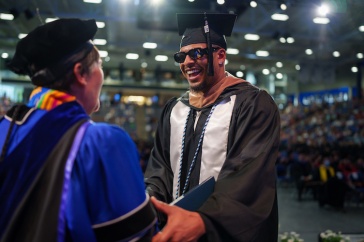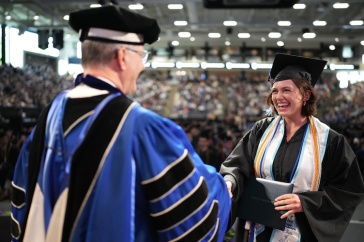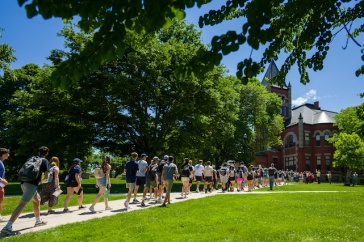
UNH faculty will be teaching, conducting research and taking part in other projects in a dozen locations outside the United States this spring.
During the spring term, faculty from both the Durham and Manchester campuses will be taking their expertise outside their traditional classrooms via a variety of fellowships and research projects. Here are some of the ways professors will be bringing their knowledge to locations as far away as Japan, New Zealand and Rwanda — to name just a few.
Fulbright Awards

Drew Conroy, professor of applied animal science at the Thompson School, is heading to Rwanda with his family for six months through his second Fulbright Scholar Award, while his son, Ross Conroy ’17, will also be studying in Rwanda through a Boren scholarship.
In 2008, through his first Fulbright award, Conroy spent one year in Namibia. This year, he will teach in Nyagatare, Rwanda, which “is also where most of the pastoralists are and also the largest wildlife park,” he explains, adding, “Much of my interest over the years has been the challenges pastoralists face living near wildlife.”
For two decades, Conroy explains, he has “consulted, assisted with workshops related to oxen and draft animal power, done research with pastoralists and farmers using oxen and taught in Africa during summers and sabbaticals.” These experiences “have allowed me to help numerous students doing undergraduate research,” he says, adding he is also advising two students who received International Research Opportunities Program awards to study in Africa during the summer.

John “Jack” Resch, professor of history and program coordinator of humanities at UNH Manchester, has received a Fulbright award to travel to Japan this spring to teach American history at the University of Ryukyus while also looking into opportunities for exchanges between UNH and the University of Ryukyus for students and faculty.
This most recent Fulbright is Resch’s third award. Previously, he traveled to both Hungary and China to share his academic expertise in support of what the Fulbright program describes as its mission: to “increase mutual understanding between the people of the United States and the people of other countries.”
CIE Grants
Three professors have received grants from the UNH Center for International Education to bring their work abroad.

Melinda Negrón-Gonzales, assistant professor and program coordinator in UNH Manchester’s social science division, will be traveling to Istanbul, Turkey, for five weeks this spring.
“I’ll present a paper at the International Conference on Eurasian Politics & Society,” she says, and will meet with staff from two study-abroad providers toward developing a UNH program in Istanbul that would begin in the summer of 2017.
Negrón-Gonzales will also meet with human rights and women’s rights activists to collect data: “It’s part of an ongoing project,” she notes. “I traveled to Turkey last summer to take a Turkish language course. My previous research in Turkey has focused on the human rights and women’s rights movements, and I’d like to build on that research.”

Marion “Molly” Girard Dorsey, associate professor of history, will be in Auckland, New Zealand, where she will present at a conference on the 1899 and 1907 Hague Conventions and their legacies, and she will then travel to Wellington for historical research in the national archives.
“At the conference, I will be speaking about the ramifications of attempts to ban poison gas — the first modern chemical weapons — and the weapons that developed from them,” she says, adding, “I will explain that by prohibiting gas before modern chemical weapons had been used in war, the Hague Conventions illustrated proactive efforts to incorporate cutting-edge science into diplomacy, an approach later followed with other weapons.”
Dorsey’s paper, “Chemical Warfare and the 1899 & 1907 Hague Conferences,” will build on this research. “I am excited about the opportunities to meet international scholars interested in the intersection of the history of law, policy, diplomacy and war,” she says. “In addition, I expect to receive feedback on my research at a key point in the writing process. Finally, I will be able to gather more material for my project, material that is impossible to access from the U.S.”

Valentini Kalargyrou, associate professor of hospitality management, is heading to Tel Aviv, Israel, to work on a disability research project at Blackout, a restaurant where patrons are served their meals in the dark, gathering data from employers, employees and guests. Kalargyrou explains, “This is the second paper of a new area of research on social entrepreneurship and disability initiatives in the hospitality industry.”
Center for Humanities Fellowships
Four faculty members will be outside the classroom at work on ongoing projects after receiving 2016-17 Center for Humanities Faculty Research Fellowships.

Harriet Fertik, assistant professor of classics, has received a fellowship for her project, “Outside the Ideal Community: Spaces for Education and Politics in Greco-Roman Antiquity and W.E.B. Dubois.” Fertik will use questions from Dubois’s classic work, “The Souls of Black Folk” in her investigation of the relationship between education and citizenship in ancient Greece and Rome.

Nicole Fox, assistant professor of sociology, will use her time as a Center for Humanities Fellow to work on her manuscript-in-progress, “Rebuilding from the Ashes of a Traumatic Past: The Everyday Complexities of Memory and Reconciliation in the Lives of Rwandan Genocide Survivors.”
The manuscript “tells the story of genocide memorials in present-day Rwanda and how they shape reconciliation practices, processes and the everyday lives of survivors,” Fox explains, noting it “builds on previous research to articulate the complicated political and social processes of reconciliation after mass trauma.”

Eliga Gould, professor and chair of the history department, has completed most of the research for the book he will be writing during his fellowship after gathering materials from U.S. libraries as well as the British National Archives and the British Library.
“I will be writing a new book on the peace treaty of 1783 that ended the American Revolutionary War. Of the three founding documents — the other two are the Declaration of Independence and the Constitution — the treaty is the one that historians have paid the least attention to,” he explains, adding he hopes to have the book completed by the summer of 2017. Gould says he was inspired to work on this book when finishing up his most recent one, “Among the Powers of the Earth: The American Revolution and the Making of a New World Empire.”

But, he adds, one of the primary inspirations for his writing in general comes from teaching: “Any time I write something, I think about whether my own students would find what I am saying interesting. Also, I often get ideas for new research and writing topics while I am working with undergraduates. In more than 20 years at UNH, that’s been one of the best things about being a professor here. I consider myself extremely fortunate that I work at a university where my own scholarly and teaching interests are so closely related."
Subrena Smith, assistant professor of philosophy, has received a fellowship for her research, “Developmental Systems Theory and Beyond,” which will be an interdisciplinary project involving philosophy, biology and psychology. Smith will evaluate the theory’s strengths and weaknesses.
Other Projects


Many faculty members will be traveling this spring to take part in a variety of projects and opportunities, including Tom Ballestero, associate professor of civil and environmental engineering, who is traveling to the Azores, South Korea and Panama, and Nadine Berenguier, professor of French, who is in the UK this year as the resident faculty member for UNH’s study abroad program in London.
John Chaston, associate professor of Spanish, is heading to Spain where he will be the resident director for UNH’s Granada program, which will include 24 UNH student participants for the spring semester.

Chaston’s focus will not only be to ensure students have the support they need in their work to advance their Spanish language skills — they will be taking 20 credit hours of courses at the Centro de Lenguas Modernas at the University of Granada — but also to provide opportunities for the students to immerse themselves in the culture. Chaston will organize outings to historical and recreational sites, and he hopes to make recordings of local residents there for his work teaching Spanish phonetics and syntax.
“I will also be working individually with some of the students on determining, preparing and laying the groundwork for individual research projects,” he explains, adding, “I hope to help and support students in having a most excellent, positive and life-changing experience. And make sure they grow and develop and all come home safely.”

Summer Cook, assistant professor of exercise physiology, is traveling to Murdoch University in Perth, Australia, to work with an exercise physiologist to develop a fall-prevention program in a retirement village.
“I will also be giving research assistance to ongoing studies in the department, and I will be doing presentations on my research at UNH,” she says, explaining, “This is a new collaboration that will result in publications from the work completed on this trip. It could also lead to future studies and student exchanges between UNH and Murdoch University.”
Nick Smith, professor of philosophy, will be spending the spring semester at Corvinus University in Budapest, Hungary. Smith will be working on an ongoing research project on communism and radical future technology as well as teaching a course entitled “Marx and His Critics in Central Europe" for a dozen UNH students.

Smith also hopes the research he is doing there “will turn into my fourth book, so I will be gestating the ideas with my students in Budapest.”
Teaching the course in Hungary “is especially exciting because Corvinus used to be Karl Marx University and still houses a large sculpture of Marx, even though Hungary has distanced itself from communism,” Smith explains.
He adds, “This is an exceptionally gifted and intellectually curious group of UNH students, and I look forward to sharing with them what will surely be one of the most exciting and meaningful times of their lives.”
-
Written By:
Jennifer Saunders | Communications and Public Affairs | jennifer.saunders@unh.edu | 603-862-3585



















































